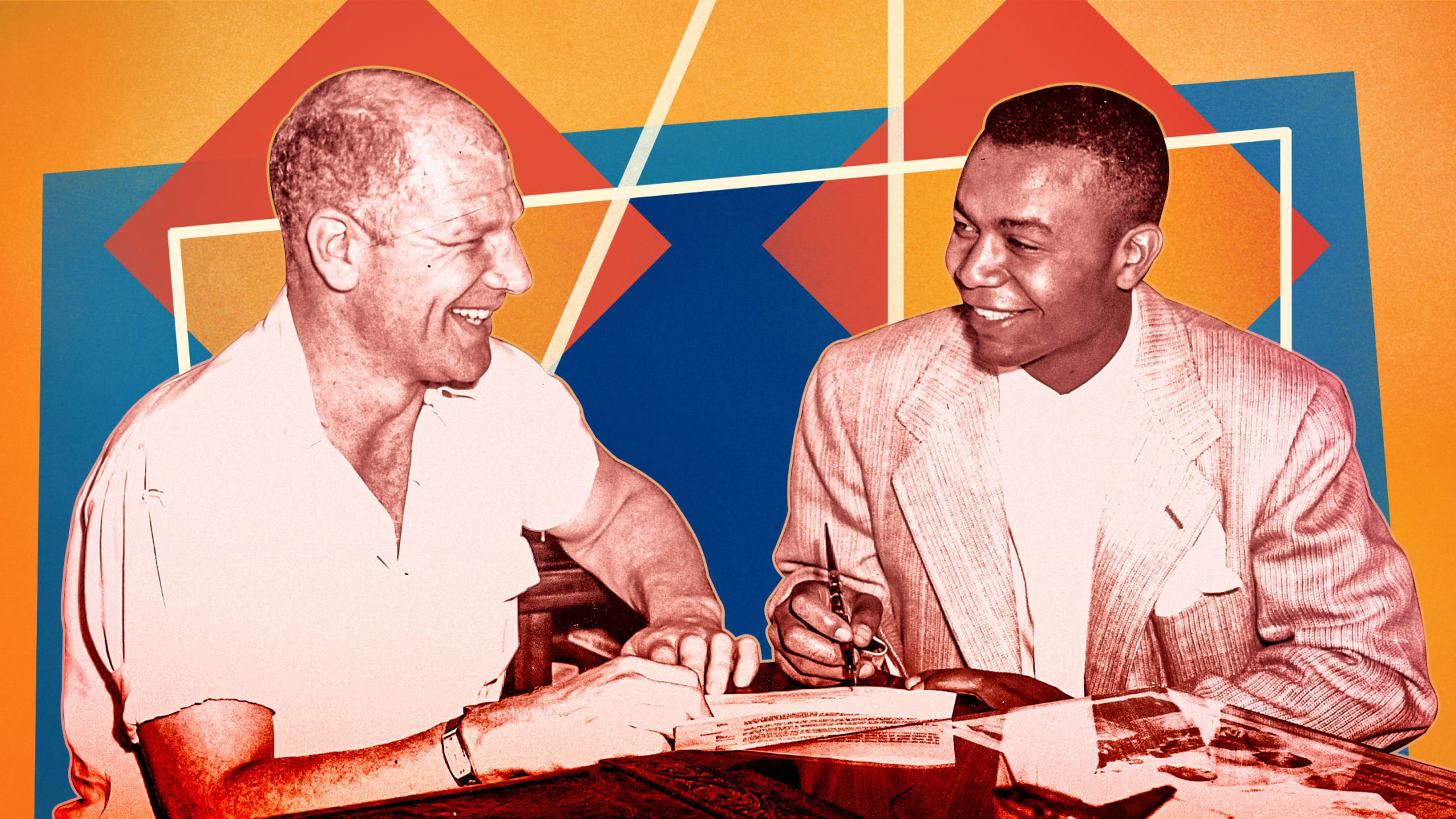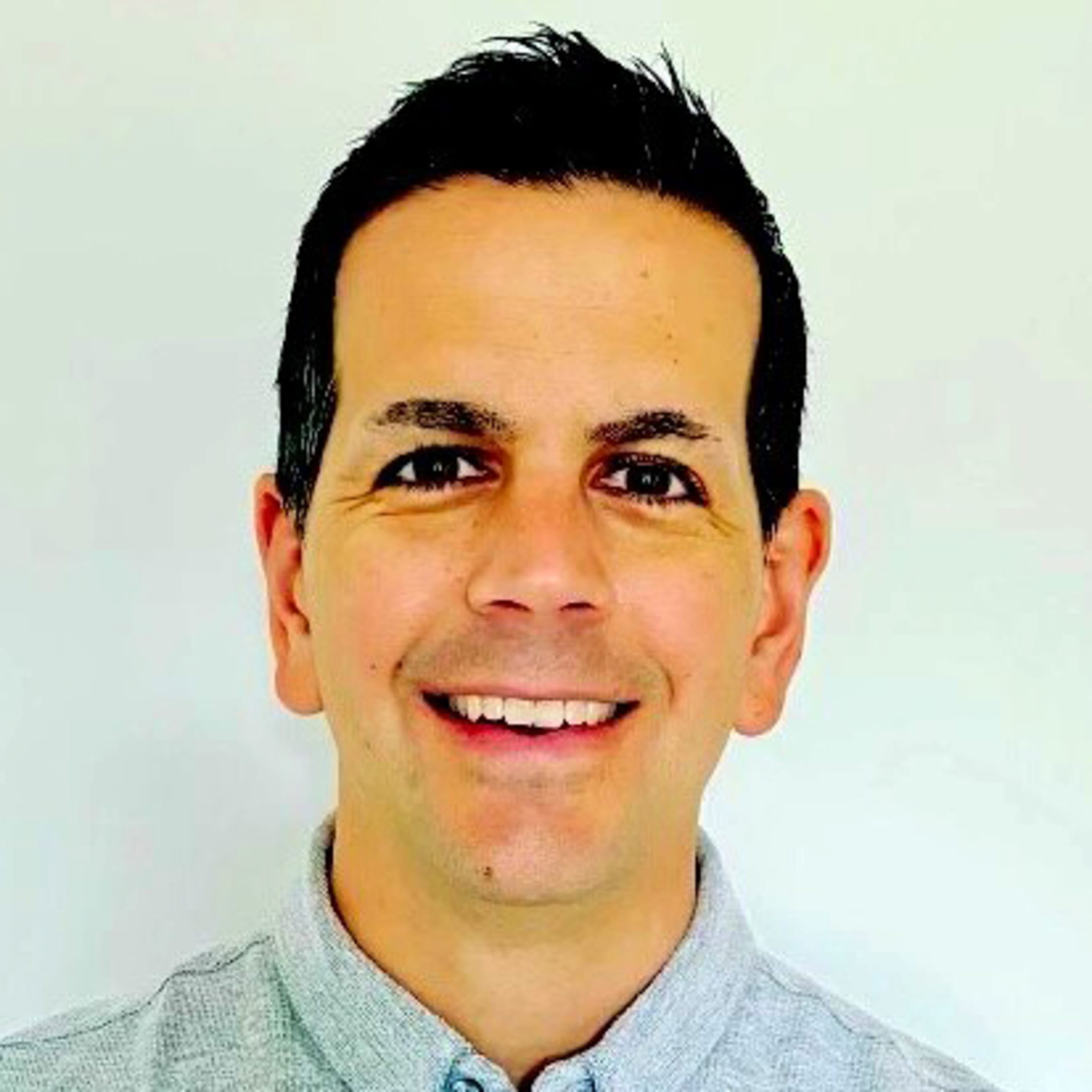
How Bill Veeck and Larry Doby forged a lasting family friendship

ST. PAUL, Minn. -- It does not currently hang at CHS Field alongside Kevin Millar’s No. 15, Darryl Strawberry’s No. 17 and the other digits formally retired by the St. Paul Saints.
But within the world of this ballclub that serves as the Triple-A affiliate of the nearby Twins, there is an understanding that Larry Doby’s No. 14 will never be assigned to a player.
To those who don’t know the full history of the man who broke the American League color barrier, this might seem strange. Doby’s career predated this incarnation of the Saints. Heck, it even predated the arrival of the Twins. It’s quite possible Doby never set foot in St. Paul in his 79 years.
Doby, though, is never in danger of going underappreciated in any realm of baseball connected to Saints co-founder and former owner Mike Veeck.
“Our families,” Mike says of the Veecks and Dobys, “have been intertwined.”
Mike Veeck’s life in baseball is chronicled well in the new documentary “The Saint of Second Chances,” which is streaming now on Netflix. It’s the story of how the formation of the then-independent Saints in 1993 revived Mike, the son of Hall of Fame owner Bill Veeck, at a time when no affiliated baseball organization would touch him because of his role in the creation of Disco Demolition Night.
Chances are, you know all about Disco Demolition Night. The July 12, 1979, promotion was one of the most infamous in-park events in baseball history. It sparked a riot at Comiskey Park and has been cited by some as a case study in the disparagement of Black music.
Both Veecks had a lot of crazy ideas (thankfully, no others as disastrous as that one). And to many, that’s how they’ll be remembered -- Bill as the “Barnum of Baseball,” Mike as the son who followed in his zig-zag footsteps. Their unorthodox innovations have left a lasting legacy on the game.
Yet the elder Veeck should also be remembered as an innovator of another sort. He was progressive in his view and appreciation for Black players at a time when the vast majority of people in his position simply were not. And Mike has taken great care to ensure that part of his father’s story is not forgotten.
“The other owners really, really hated him,” Mike says of Bill. “They could smile and say, ‘Oh hey, Bill, that was a funny promotion.’ But they never accounted for the changes to the game that he made that made them money, and they never accounted for the social change. They only give him credit for what was secondary.”
So what’s an important thing to remember about Bill Veeck?
“He purchased the contract of Lawrence Doby from Effa Manley,” Mike says, before pausing for effect. “Purchased.”
Purchased.
We throw that term around a lot with regard to contracts changing hands in sports, but think about what it meant in 1947 for the owner of the Cleveland Indians to not only bring aboard a player directly from the Negro National League but to actually compensate Manley -- the owner of the Newark Eagles -- for the rights to Doby.
As celebrated and significant as the Dodgers’ decision to sign Jackie Robinson in late 1945 is and should be, it should also be understood that Branch Rickey’s club did not compensate Robinson’s Kansas City Monarchs for his rights. Nor did Rickey compensate the Negro League teams of Roy Campanella, Don Newcombe and John Wright when he signed them in 1946. The Dodgers did compensate the Philadelphia Stars when they signed Roy Partlow that year, but only to the tune of $1,000.
For Veeck to pay Manley and the Eagles $15,000 for Doby (plus another $5,000 once Doby spent 30 days with Cleveland) was a significant show of respect for the Negro Leagues.
It’s something Doby’s son, Larry Doby Jr., appreciates.
“That’s called integrity,” Doby Jr. says. “He didn’t have to do that. Nobody forced him to do it, but he thought it was right. That gets lost so much with the fact that he had [small person Eddie Gaedel] batting and stuff like that. People look at him like he was a big joke. But he was a good baseball man.”
Bill Veeck grew up in Hinsdale, Ill., an affluent suburb of Chicago. He was the son of Cubs president William Veeck.
Mike Veeck tells a story about his father accompanying his grandfather to the Cubs’ box office, where the tills from games at Wrigley Field were emptied.
“What color is that money?” William asked his son.
“Green,” Bill responded.
“And what’s the color of the man who put that money in the till?” William asked.
Bill thought for a second.
“I don’t know,” he responded.
“Exactly,” his dad said.
Bill became something of a colorblind baseball fan, attending home games of the Negro Leagues’ Chicago American Giants and the annual East-West All-Star Games held at Comiskey Park. He studied the names of Negro League players just as he would memorize the rosters of AL and NL teams. Those formative experiences had an impact on everything that came after.
Some historians have debated Veeck’s claim in his autobiography, “Veeck As in Wreck,” that he planned to buy the Phillies in 1942 and stock their roster with Negro League players.
The younger Veeck insists it’s true.
“He never lied to me,” Mike says. “He had had all this time on his hands after being injured [in World War II]. I mean, he spent almost a year in bed, which is where his voracious reading came from. And it gave him plenty of time to watch the horizon [and think about baseball’s future]. And he offered more money than [William D.] Cox offered [to buy the Phillies].”
Bill Veeck’s claim was that Commissioner Kenesaw Mountain Landis spiked his purchase of the club because of the plan to roster Black players. Whether or not that’s true, there is no doubt that Veeck was opposed to segregation.
In that same year of 1942, when Veeck was the co-owner of the Triple-A Milwaukee Brewers, he sat in the “colored section” of the bleachers during Spring Training in Ocala, Fla., to chat with fans. He refused to leave when security tried to get him to respect the city’s segregation ordinance, and he threatened to pull the Brewers out of the town when the mayor tried to intervene.
“What offends me about prejudice,” Veeck wrote in his autobiography, “is that it assumes an unwarranted superiority.”
Veeck became the owner of the Cleveland club on June 22, 1946. Though he would later write that he progressed “slowly and carefully, perhaps even timidly” toward putting a Black player on his roster, it was only a matter of months before he hired Bill Killefer, a former player and longtime coach, to scout the Negro Leagues, and a Black promotor named Louis Jones as his director of public relations – the first Black executive in MLB, tasked with preparing city leaders for the desegregation of the team.
When Doby became Veeck’s choice to integrate the AL, things happened fast for both men. A newspaper reporter in Newark got the scoop, and that sped up Doby’s arrival from after the All-Star break to just before it. Doby played his last game with the Eagles, then he and his wife, Helyn, took an overnight train to Chicago. Jones met them there, and they all got in a taxi that stopped at the team hotel to pick up Veeck.
“Lawrence, I’m Bill Veeck,” the owner introduced himself.
“Nice to meet you, Mr. Veeck,” Doby replied.
“You don’t have to call me Mr. Veeck. Call me Bill.”
They were friends from that day forward. If Helyn wasn’t on the road with Doby in those days, Veeck was.
“If my father wasn’t going well, he’d get a phone call from Mr. Veeck saying, ‘I’m coming to town, let’s go listen to some jazz,’” Doby Jr. says. “It was a lovely relationship. My father lost his father when he was 8 years old. He said if his father would have lived, he would have been the kind of man Mr. Veeck was. When Mr. Veeck signed my father, he said, ‘We are in this together.’ Those are just words, but he proved those words to be true.”
They might fight over which jazz club to visit (as the years progressed, Doby would argue that Miles Davis was the best jazz musician, while Veeck stumped for Louis Armstrong), but they had a mutual respect.
“They had that kind of the kind of relationship that people have when they both were in a war together,” Mike says. “Because what they were doing was so dangerous. And they understood that.”
Doby started slowly with Cleveland, but, in his first full season in 1948, broke out in a big way for a Tribe team that won what still stands as the city’s most recent World Series title. That team included not just Doby but also Satchel Paige, whom Veeck had brought aboard as the first Black pitcher in the AL.
Though Veeck sold the club after 1949, he and Doby would work together again when Veeck bought the White Sox in 1976 and hired Doby as his hitting coach. Veeck fired manager Bob Lemon midseason the following year and promoted Doby to the role, making Doby both the second Black player in MLB to Jackie Robinson and the second Black manager to Frank Robinson.
Alas, Doby was not as successful in the managerial role as he was in the playing role. He was a classic case of a coach growing impatient with players who didn’t possess the baseball skill and intelligence he had.
“My dad said Larry would never be a great manager because it didn’t make any sense to Larry when a kid would throw to the wrong base,” Mike Veeck says. “And you know, Larry could remember every guy who had done him a disservice.”
Unfortunately, for a Black man in what was once a segregated game, that list was pretty long. But in Veeck, Doby found an ally, an advocate, a friend.
“My father always said he couldn’t have done what he did without God, without my mom and without Mr. Veeck,” Doby Jr. says. “He said he could trust Mr. Veeck, because his word was his bond. As simple as that sounds, it’s not that way with a lot of people. The relationship was lifelong, it was close, and it was meaningful to both of them.”
The Dobys and Veecks continue to support each other. When “The Saint of Second Chances” debuted at the Tribeca Film Festival recently, Doby Jr. attended.
“I’m glad he invited me and I went,” Doby Jr. says. “I got to tell him how proud I was. A lot of people who consider themselves baseball people don’t know who my father was. It doesn’t bother me, because I was raised to expect that. But the fact that Mike does not forget and honors my dad is awesome.”
When Mike became the owner of baseball franchises in independent and Minor League ball, he set aside what he refers to as the “Larry Doby seating section,” where kids from the inner city could get cheap or free tickets, hot dogs, soda and chips to help instill a love of the game.
Though Veeck’s group sold the Saints earlier this year, the club continues to honor the tradition of not assigning Doby’s No. 14. Doby’s number is also retired by the Single-A Charleston RiverDogs club that Veeck co-owns.
It’s Veeck’s way of acknowledging an innovation that his father does not get enough credit for -- and the friendship between Veeck and Doby that formed as a result.
“It was a relationship of love,” Mike Veeck says. “They loved one another.”
